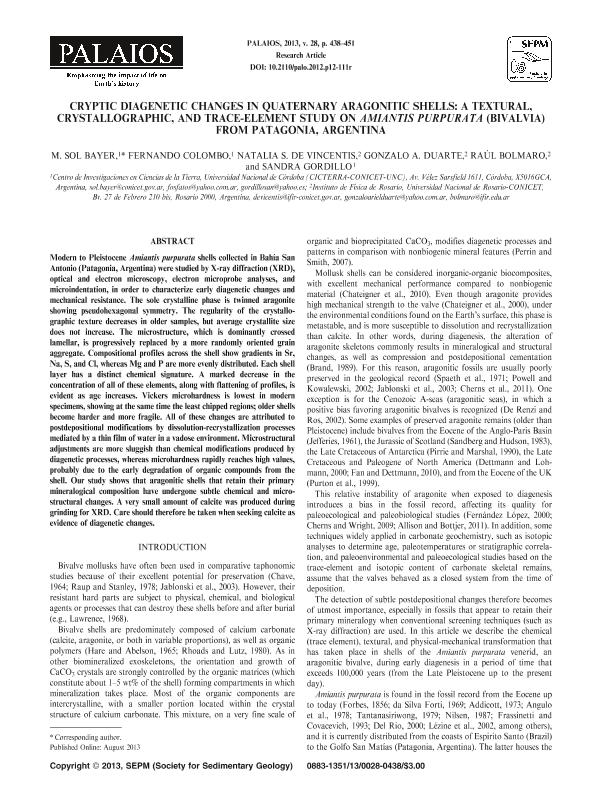Mostrar el registro sencillo del ítem
dc.contributor.author
Bayer, María Sol

dc.contributor.author
Colombo, Fernando

dc.contributor.author
de Vincentis, Natalia Soledad

dc.contributor.author
Duarte, Gonzalo
dc.contributor.author
Bolmaro, Raul Eduardo

dc.contributor.author
Gordillo, Sandra

dc.date.available
2016-09-09T18:54:40Z
dc.date.issued
2013-08
dc.identifier.citation
Bayer, María Sol; Colombo, Fernando; de Vincentis, Natalia Soledad; Duarte, Gonzalo; Bolmaro, Raul Eduardo; et al.; Cryptic Diagenetic Changes in Quaternary Aragonitic Shells: A Textural, Crystallographic, and Trace-Element Study on Amiantis Purpurata (Bivalvia) From Patagonia, Argentina; Geo Science World; Palaios; 28; 7; 8-2013; 438-451
dc.identifier.issn
0883-1351
dc.identifier.uri
http://hdl.handle.net/11336/7586
dc.description.abstract
Modern to Pleistocene Amiantis purpurata shells collected in Bahı´a San Antonio (Patagonia, Argentina) were studied by X-ray diffraction (XRD), optical and electron microscopy, electron microprobe analyses, and microindentation, in order to characterize early diagenetic changes and mechanical resistance. The sole crystalline phase is twinned aragonite showing pseudohexagonal symmetry. The regularity of the crystallographic texture decreases in older samples, but average crystallite size does not increase. The microstructure, which is dominantly crossed lamellar, is progressively replaced by a more randomly oriented grain aggregate. Compositional profiles across the shell show gradients in Sr, Na, S, and Cl, whereas Mg and P are more evenly distributed. Each shell layer has a distinct chemical signature. A marked decrease in the concentration of all of these elements, along with flattening of profiles, is evident as age increases. Vickers microhardness is lowest in modern specimens, showing at the same time the least chipped regions; older shells become harder and more fragile. All of these changes are attributed to postdepositional modifications by dissolution-recrystallization processes mediated by a thin film of water in a vadose environment. Microstructural adjustments are more sluggish than chemical modifications produced by diagenetic processes, whereas microhardness rapidly reaches high values,probably due to the early degradation of organic compounds from the shell. Our study shows that aragonitic shells that retain their primary mineralogical composition have undergone subtle chemical and microstructural changes. A very small amount of calcite was produced during grinding for XRD. Care should therefore be taken when seeking calcite as evidence of diagenetic changes.
dc.format
application/pdf
dc.language.iso
eng
dc.publisher
Geo Science World
dc.rights
info:eu-repo/semantics/openAccess
dc.rights.uri
https://creativecommons.org/licenses/by-nc-sa/2.5/ar/
dc.subject
Mollusca
dc.subject
Quaternary
dc.subject
Amiantis Purpurata
dc.subject
Diagenesis
dc.subject.classification
Ingeniería de los Materiales

dc.subject.classification
Ingeniería de los Materiales

dc.subject.classification
INGENIERÍAS Y TECNOLOGÍAS

dc.subject.classification
Paleontología

dc.subject.classification
Ciencias de la Tierra y relacionadas con el Medio Ambiente

dc.subject.classification
CIENCIAS NATURALES Y EXACTAS

dc.subject.classification
Otras Ciencias Naturales y Exactas

dc.subject.classification
Otras Ciencias Naturales y Exactas

dc.subject.classification
CIENCIAS NATURALES Y EXACTAS

dc.title
Cryptic Diagenetic Changes in Quaternary Aragonitic Shells: A Textural, Crystallographic, and Trace-Element Study on Amiantis Purpurata (Bivalvia) From Patagonia, Argentina
dc.type
info:eu-repo/semantics/article
dc.type
info:ar-repo/semantics/artículo
dc.type
info:eu-repo/semantics/publishedVersion
dc.date.updated
2016-06-10T18:37:13Z
dc.journal.volume
28
dc.journal.number
7
dc.journal.pagination
438-451
dc.journal.pais
Estados Unidos

dc.journal.ciudad
Lawrence
dc.description.fil
Fil: Bayer, María Sol. Consejo Nacional de Investigaciones Científicas y Técnicas. Centro Científico Tecnológico Córdoba. Centro de Investigaciones En Ciencias de la Tierra; Argentina
dc.description.fil
Fil: Colombo, Fernando. Consejo Nacional de Investigaciones Científicas y Técnicas. Centro Científico Tecnológico Córdoba. Centro de Investigaciones En Ciencias de la Tierra; Argentina
dc.description.fil
Fil: de Vincentis, Natalia Soledad. Consejo Nacional de Investigaciones Científicas y Técnicas. Centro Científico Tecnológico Rosario. Instituto de Física de Rosario (i); Argentina
dc.description.fil
Fil: Duarte, Gonzalo. Consejo Nacional de Investigaciones Científicas y Técnicas. Centro Científico Tecnológico Rosario. Instituto de Física de Rosario (i); Argentina
dc.description.fil
Fil: Bolmaro, Raul Eduardo. Consejo Nacional de Investigaciones Científicas y Técnicas. Centro Científico Tecnológico Rosario. Instituto de Física de Rosario (i); Argentina
dc.description.fil
Fil: Gordillo, Sandra. Consejo Nacional de Investigaciones Científicas y Técnicas. Centro Científico Tecnológico Córdoba. Centro de Investigaciones En Ciencias de la Tierra; Argentina
dc.journal.title
Palaios

dc.relation.alternativeid
info:eu-repo/semantics/altIdentifier/url/http://palaios.geoscienceworld.org/content/28/7/438.article-info
dc.relation.alternativeid
info:eu-repo/semantics/altIdentifier/doi/http://dx.doi.org/10.2110/palo.2012.p12-111r
Archivos asociados
